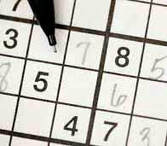
AT OUR final meeting for the year, South Coast Speakers Toastmasters club holds an informal dinner gathering which includes a Kris Kringle gift exchange. We keep the value low as it’s just a bit of fun at Christmas time. I have heard that in past years some of the “gifts” have not seemed very … gifty. Socks, for example.
This year’s selection was pretty good. I recall handmade chocolate treats, a very popular spiced couscous product ready to make at home, and other simple but pleasant things. Perhaps the most unexpected was a set of puzzle books. Which came to me.
I thought I could offer them to one of my brothers. Some years ago I was chatting with him and in the course of the conversation it emerged that he liked doing Sudoku, said it was fun. I couldn’t believe it. My brother – hard working, responsible, and very busy with his work as an architect – doing puzzles.
Or perhaps even better, to one of my oldest friends, who likes doing puzzles too. Every so often one of those “I bet you can’t figure this out” memes pops up on Facebook and there she is, figuring it out ahead of everyone else. She’s retired now but when puzzles first came up as a topic of conversation between us she was a teacher specialising in teaching English as a second language. Again; challenging work, and then actually choosing to do puzzles in the evenings – crosswords, shape puzzles, and, yes, Sudoku. It made no sense to me.
As for myself, I have sometimes done crosswords. They appeal to my enjoyment of language and vocabulary. Even cryptic ones; the mother of a friend once taught me some hints for cracking the clues. Still, I never really got into it.
And I’ve had a look at Sudoku in a daily newspaper a couple of times. I quickly got the principle: it’s a puzzle using numbers in a grid. You don’t have to do anything challenging like add them up, you just arrange numerals one to nine so there’s one, and only one, of each numeral in each column, row and square. I have enough fingers to count one to nine; so far, so good. But then try to do it and I might as well have been calculating the density of Earth. I couldn’t even figure out where to start. So many empty squares, so few numbers given to start me off, and no discernible pattern. And this was “easy” level. Ah, forget it. Surely my time can be better spent.
But then these puzzle books came along, just as Pauline and I found ourselves with a few days over Christmas totally without commitments. Determined to give ourselves a proper break we booked a cabin in the bush and took off. I even left my beloved BodyBalance mat at home, but threw the puzzle books into my bag in case I got really bored.
I didn’t get bored; we had the most wonderful time walking in the area around Mt Baw Baw. But because I had taken a break which created a little space in my ever-occupied mind, I allowed myself to have a go at these puzzle books that had found their way into my life. Even the Sudoku one.
I read carefully the instructions which included suggestions how to identify which numbers might go where. It boils down to logic and the method of elimination. So I took several deep breaths, sharpened my pencil, and with intent to retain a relaxed holiday attitude, started.
Imagine my amazement when I figured the first one out! It took a few goes, but I did it. By now I’ve done some twenty Sudokus. I’m still at level one difficulty but just a few evenings ago I did two in about 45 minutes. Hardly calculating the density of the Earth, but an achievement for me.
What’s happened? I switch between the books, sometimes preferring to do a crossword or a word search but always something before bedtime. I’ve found it a great way to distract my busy thoughts from the day’s activities or tomorrow’s planning. Sometimes I’ll wake up with the pencil tip on the page ahead of a wavy line where I’ve drifted off in the middle of marking something.
Far from the waste of time I once thought it was, I now have some understanding why my brother and my friend, both with busy brain-heavy daytime work, chose to do puzzles for some of their off-work time. It helps switch off and de-stress, and I believe it is helping my memory. As a group exercise instructor and retail worker I must have hundreds of names to try to match to faces and I’ve always struggled with it. It’s still a huge task but I’m certainly getting better, and can learn and recall several new names at once for the duration of a class, and, often, even when they return for their next.
My unexpected Kris Kringle, of much greater worth than its modest monetary value. Truly, a delightful gift.